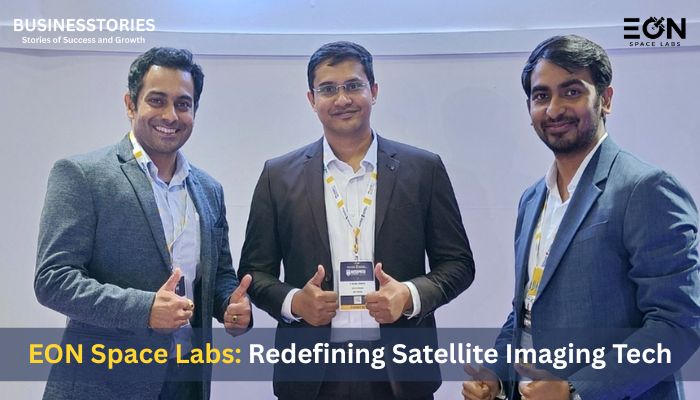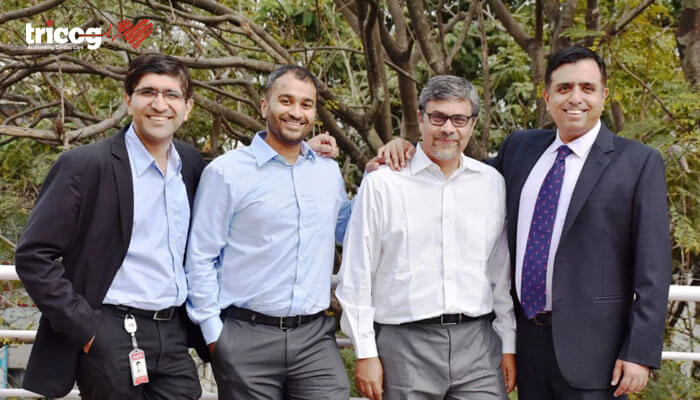In India’s fast-rising deep-tech ecosystem, EON Space Labs is gaining a widespread reputation as one of the most innovative start-ups in satellite and drone imaging technology. Founded in Hyderabad in 2022, the company is redefining next-generation Earth observation with miniaturized, high-performance imaging payloads that are lighter, smaller, and more cost-effective than traditional systems. With its upcoming MIRA telescope and cutting-edge EO/IR solutions, EON is positioning itself at the forefront of the global space imaging industry.
The company’s journey has roots in the deep expertise of its founders—Sanjay Kumar (CEO), Punit Badeka (COO), and Manoj Kumar Gaddam (CTO)—who bring extensive backgrounds in aerospace engineering, optics, and high-precision manufacturing. Before forming EON Space Labs, they worked together on defense-grade imaging systems, including ultra-light riflescopes, thermal sights, and even large RC telescopic systems for defense applications, building their capabilities from concept to commercialization.
Their previous partnerships with institutions such as the University of Rochester and the Boston Foundation of Sight further sharpened their skills in adaptive optics and microscopic imaging, fortifying the technical foundation on which EON was built.
Also Read: NavAlt Solar & Electric Boats: Redefining Maritime Mobility with Clean Energy
The Mission of EON Space Labs
EON Space Labs was founded with a bold vision: to democratize access to space-grade imaging systems. By reimagining traditional Earth observation technology, the startup aims to make high-quality imaging available to industries and researchers that were previously limited by cost and complexity.
The company’s mission focuses on miniaturizing and optimizing imaging payloads for satellites, drones, and terrestrial platforms. This innovation allows governments, businesses, and scientists to capture detailed, high-resolution data at a fraction of conventional costs.
Through a vertically integrated model—from design and prototyping to in-house manufacturing—EON Space Labs delivers speed, precision, and affordability. This approach not only accelerates innovation but also contributing India’s Atmanirbhar Bharat initiative of technological self-reliance.
Cutting-Edge Technologies Driving Innovation
DEGA: Imaging for CubeSats
EON’s DEGA payload is an ultra-compact system designed for 1U CubeSats. Despite weighing under 200 g, it delivers a 15 m ground resolution from 500 km orbit, making it one of the lightest satellite imagers globally.
TUNIGA: Higher Resolution for Larger CubeSats
TUNIGA enhances field-of-view and offers 4 m resolution from orbit, making it ideal for Earth observation missions that demand sharper data in compact form.
MIRA: India’s Lightest Space Telescope
Perhaps the most exciting innovation is MIRA, a miniaturized space telescope capable of capturing both panchromatic and multispectral imagery. With a resolution of 4 m (panchromatic) and 12 m (multispectral), MIRA will serve agriculture, environment monitoring, and defense applications. Its launch is scheduled for late 2025, and it promises to be India’s lightest space telescope to date.
ARGUS: Ultra-High-Resolution Imaging
ARGUS pushes boundaries with 0.7 m resolution, catering to defense, surveillance, and precision mapping needs.
LUMIRA: EO/IR Drone Payloads
On the terrestrial side, LUMIRA is an advanced EO/IR (Electro-Optical/Infrared) payload designed for drones and ground vehicles. Featuring AI-based target recognition and lightweight engineering, LUMIRA enables surveillance, search-and-rescue, and border security missions with unmatched efficiency.
Funding and Strategic Partnerships
In August 2025, EON Space Labs raised $1.2 million in Pre-Series A funding, led by MGF Kavachh with strategic participation from HHV Advanced Technologies. This funding will fuel new product launches, expand the engineering team, and scale up manufacturing for upcoming payloads.
HHV’s partnership brings decades of expertise in precision optics and thin-film technologies, strengthening EON’s ability to deliver world-class imaging systems at large scale.
Applications Across Industries
EON Space Labs’ miniaturized imaging solutions are transforming industries by making Earth observation more accessible, scalable, and impactful. In agriculture sector, their multispectral imaging technology helps monitor crop health, soil conditions, and yield forecasts, empowering farmers with data-driven decisions. Similarly, in environmental monitoring, their payloads track deforestation, pollution, and natural disasters, enabling rapid response and sustainable resource management.
Beyond environmental applications, EON’s innovations play a crucial role in defense and security, where AI-enabled EO/IR systems support surveillance, border monitoring, and UAV surveillance. Their technology also fuels urban planning and research, assisting governments and organizations in developing smart cities, improving infrastructure mapping, and conducting advanced climate studies that shape resilient futures.
The Team Behind the Innovation
EON Space Labs was founded by Sanjay Kumar (CEO), Punit Badeka (COO), and Manoj Kumar Gaddam (CTO)—all of whom bring deep experience in optics, aerospace, and defense imaging systems.
From building ultra-light riflescopes and thermal sights to collaborating with ISRO and international research institutes, the founding team has consistently demonstrated its ability to take advanced imaging concepts from design to commercialization.
Also Read: Radome Technologies: AI for Zero-Failure Aerospace and Industry
The Road Ahead
Looking ahead, EON Space Labs is gearing up for a defining phase of growth and innovation. The company plans to launch MIRA in 2025, marking the debut of India’s lightest space telescope, while also expanding its LUMIRA payload line for drones and mobile platforms. These advancements demonstrate its commitment to building versatile imaging solutions that address both space and terrestrial needs.
To accelerate this vision, EON Space Labs will scale manufacturing with strategic partners and target a significant share of the $11 billion global surveillance and imaging market. With its blend of innovation, affordability, and scalability, the startup is well-positioned to play a pivotal role in shaping the future of Earth observation and imaging technology worldwide.
Conclusion
EON Space Labs is more than just another space startup—it is a deep-tech innovator pushing the boundaries of what is possible in miniaturized imaging systems. By developing lightweight satellites, EO/IR drone payloads, and India’s first miniaturized space telescope, the company is carving a niche in a global industry ripe for disruption.
As their technologies launch into orbit and deploy across sectors, EON Space Labs is set to become a name synonymous with precision, accessibility, and the future of imaging in space and beyond.




